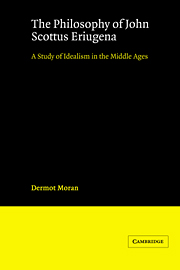Book contents
- Frontmatter
- Contents
- Preface
- Acknowledgments
- Chronology
- List of abbreviations
- 1 European intellectual culture in the ninth century
- 2 The predestination debate
- 3 Eriugena's life and early writings
- 4 The Greek awakening
- 5 The Periphyseon
- 6 Eriugena as philosopher
- 7 Eriugena's sources
- 8 Dialectic, philosophy, and the life of the mind
- 9 The meaning of human nature
- 10 Self-knowledge and self-definition: the nature of human knowing
- 11 The meaning of non-being
- 12 The meaning of nature
- 13 Eriugena's influence on later mediaeval philosophy
- 14 Conclusion
- Bibliography
- Index nominum
- Index rerum
8 - Dialectic, philosophy, and the life of the mind
Published online by Cambridge University Press: 05 June 2012
- Frontmatter
- Contents
- Preface
- Acknowledgments
- Chronology
- List of abbreviations
- 1 European intellectual culture in the ninth century
- 2 The predestination debate
- 3 Eriugena's life and early writings
- 4 The Greek awakening
- 5 The Periphyseon
- 6 Eriugena as philosopher
- 7 Eriugena's sources
- 8 Dialectic, philosophy, and the life of the mind
- 9 The meaning of human nature
- 10 Self-knowledge and self-definition: the nature of human knowing
- 11 The meaning of non-being
- 12 The meaning of nature
- 13 Eriugena's influence on later mediaeval philosophy
- 14 Conclusion
- Bibliography
- Index nominum
- Index rerum
Summary
Dialectic as the life of the mind
One of the main features of Eriugena's philosophy which impressed Hegel and the German idealists was his use of a sophisticated dialectic with moments of progression and recollection, which the idealists took to be identical with their own dialectical method. We must therefore examine Eriugena's conception of dialectic to see whether it does conform to the idealist pattern. Since Eriugena is separated from German philosophy by a gap of a thousand years, we must recover his method of dialectic through a careful hermeneutic of the historical meanings of philosophy (and dialectica) in the early mediaeval period.
In this chapter we shall explore Eriugena's understanding of the nature of dialectic (which was contained within philosophy) to see whether he remains within the boundaries of the Carolingian worldview or whether his concept transcends the intellectual limits of that time to achieve transhistorical status as a universal method of philosophy. I shall argue that his exposure to Byzantine Christian culture led him to develop a new conception of the nature of philosophy which is more radically intellectualist and idealist than any conception of philosophy to be found in the Latin West in his time. Through the Greeks he came to modify his understanding of dialectic to include a negative dimension, developed from the extension of the Eastern method of negative theology (where it is applied to God) to apply to human nature and to the world.
- Type
- Chapter
- Information
- The Philosophy of John Scottus EriugenaA Study of Idealism in the Middle Ages, pp. 123 - 153Publisher: Cambridge University PressPrint publication year: 1989



